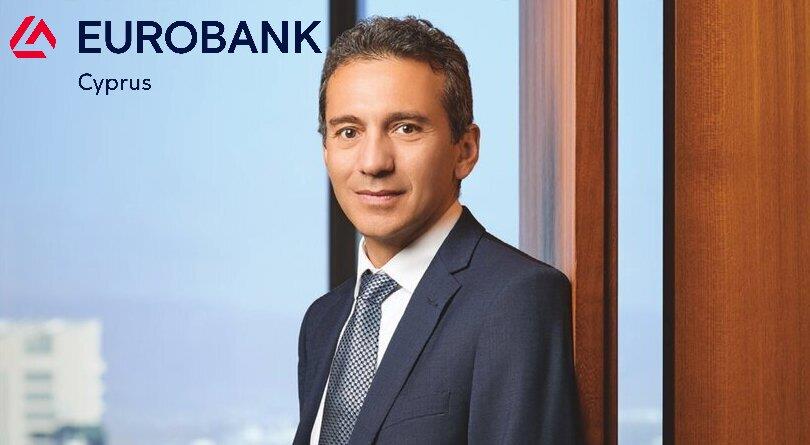Marios Hadjikyriacos, Manager, Wealth Management at Eurobank Cyprus explains why the Bank has embraced the latest trends in wealth management and shares his assessment of how the global markets will likely be performing in the second half of 2024.
Eurobank seems to defy traditional norms by supporting fintech innovations, exemplified by your collaboration with Temenos which has yielded the Wealth Portal, among others. What motivates this collaborative approach rather than viewing fintech as a competitor?
Wealth management is currently undergoing a significant shift, which is mostly driven by evolving client expectations where personalisation and accessibility are of utmost importance. Technological innovation is, therefore, imperative for players to successfully participate in this ever-competitive market environment. The emergence of new tools can lead to a more robust and comprehensive wealth service offering. These include, among others, platform investing, digital wealth planning and real-time trading strategies. The use of artificial intelligence (AI) helps create a highly customised product offering, accessible to a broader group of investors and, at the same time, it is fully compatible with each individual client’s risk tolerance and investment objectives. All these technological advancements have already started to reshape the wealth management business as we know it.
Eurobank has embraced the new trends in wealth management and invested in advanced technological platforms. More specifically, our strategic relationship with Temenos resulted in the introduction of a suite of products dedicated to our wealth management business.
Regarding the Wealth Portal, what tools are available to your clients and how have they responded to this service?
The innovative Wealth Portal is our new client solution for managing investment portfolios and is fully integrated with our core banking system. This tool enables our clients to have complete control of their investment portfolios 24/7.
The Portal offers access to a wide range of Online tools so that clients can monitor and manage seamlessly their investment portfolios. These include:
- Real-time placement of investment orders in stocks, bonds, ETFs, mutual funds, etc.
- Access to insightful analytics and interactive views of their investment portfolios
- Electronic completion of applications, questionnaires and submission of preferences
- Reception and evaluation of the Bank’s investment proposals (applicable to our Investment Advisory Service clients)
Our clients embraced this solution early on as it enabled them to have a holistic view of their investments and risks. More than half of our clients are currently deploying and monitoring their investment strategies through the Wealth Portal.
With Generative AI currently in the spotlight, what impact do you foresee it having on wealth management?
Artificial intelligence is significantly transforming wealth management and investment for three main reasons: it enhances decision-making, increases efficiency and expands personalisation. AI-driven tools and algorithms analyse vast amounts of data at unprecedented speeds, identifying trends and opportunities that might be overlooked by human analysts. This enables more accurate predictions and timely investment decisions. AI is also becoming a vital tool for facilitating highly personalised customer experiences, introducing tailored investment strategies that are fully aligned with risk profiles and objectives. Lastly, AI automates routine tasks, thereby reducing costs and allowing wealth managers to focus on more strategic activities. It is important to note that human interaction remains of paramount importance in wealth management, as it serves as the basis for creating long-term relationships of trust, recognition and partnership between clients and investment advisors.
How have the markets performed in the first half of 2024?
The first half of 2024 offered mixed signals to investors. European equities have been consolidating since the end of March, while US equities are making new all-time highs. Of course, the US stock market is heavily tilted towards certain IT companies which are supported by record corporate profits and positive investor sentiment. Valuations are still above the long-term averages but have the impetus to stay at such levels for longer than anticipated. On the other hand, Eurozone equities trade at more attractive levels given their ‘value stock’ characteristics.
In the fixed income space, capital returns have been ‘anaemic’ in 2024, particularly in government and investment grade corporate bonds where yields have been hovering at approximately the same levels as in 2023. The opportunity of “locking-in” positive returns for longer periods is still an attractive risk/reward strategy relative to the compressed equity premium.
In terms of foreign exchange, EUR/USD has been trading in the 1.06-1.10 range with no decisive directional movement taking place as of now. Notable has been the surge in gold prices to above $2,400 per ounce, defying its correlation with the US Dollar and Real Rates. The strong momentum has been fading recently but prices seem to have found a new equilibrium above $2,000 per ounce for the foreseeable future.
Finally, the US Federal Reserve and the European Central Bank are taking divergent paths on rate cuts, with the Fed delaying until later in 2024 and the ECB already cutting rates early June. How do you anticipate this divergence affecting the markets?
Inflationary risks in Europe were in balance over the second quarter, giving the ECB the opportunity to reduce interest rates prior to the Federal Reserve. Economic conditions and inflation readings in the US, along with the fiscal expansion leading to the presidential elections, are expected to push rate cuts by the Fed towards the end of the year. However, the markets seem to consider this divergence to be of a temporary nature and an ordinary outcome given the aforementioned dynamics. Data suggests that we are currently in the sweet spot of decelerating growth without excessive risks in the near term. Consequently, we do not foresee interest rate differentials driving a divergence in asset valuations on the two continents.
(Photo by Taspho)
(This article first appeared in the 2024 edition of The Cyprus Journal of Wealth Management, commissioned by Eurobank Cyprus and published by IMH. Click here to view the article. Click here to view the entire magazine online.)









